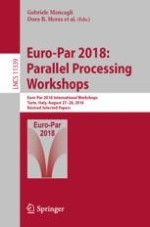2019 | OriginalPaper | Buchkapitel
Fast Heuristic-Based GPU Compiler Sequence Specialization
verfasst von : Ricardo Nobre, Luís Reis, João M. P. Cardoso
Erschienen in: Euro-Par 2018: Parallel Processing Workshops
Aktivieren Sie unsere intelligente Suche, um passende Fachinhalte oder Patente zu finden.
Wählen Sie Textabschnitte aus um mit Künstlicher Intelligenz passenden Patente zu finden. powered by
Markieren Sie Textabschnitte, um KI-gestützt weitere passende Inhalte zu finden. powered by
